Regulierung internationaler Finanzmärkte und Banken
Diese Forschungsgruppe analysiert Ursachen und Konsequenzen von internationalen Aktivitäten von Banken sowie den regulatorischen Rahmen, innerhalb dessen globale Banken operieren.
International aktive Banken können eine effiziente internationale Kapitalallokation vereinfachen und zur internationalen Risikoteilung beitragen. Allerdings können sie auch Instabilitäten generieren und zu einer Übertragung von Schocks über nationale Grenzen hinaus beitragen. Dies ist einer der Gründe für die aktuelle Re-Regulierung des internationalen Bankensystems.
Die Forschungsgruppe trägt auf drei verschiedenen Wegen zur Literatur bei. Erstens analysiert die Gruppe empirisch, warum internationale Banken global aktiv sind und wie Schocks im Finanzsystem übertragen werden. Zweitens untersucht die Gruppe das Entstehen von systemischen Risiken und Ungleichgewichten im integrierten Bankenmarkt und die sich daraus ergebenden Konsequenzen für die Realwirtschaft. Drittens werden die Auswirkungen von Änderungen bezüglich der Bankenaufsicht und Bankenregulierung analysiert, mit einem besonderen Fokus auf dem europäischen Integrationsprozess
IWH-Datenprojekt: International Banking Library
Forschungscluster
Wirtschaftliche Dynamik und StabilitätIhr Kontakt

Mitglied - Abteilung Finanzmärkte
PROJEKTE
07.2017 ‐ 12.2022
Die politische Ökonomie der europäischen Bankenunion
Europäischer Sozialfonds (ESF)
Ursachen für nationale Unterschiede in der Umsetzung der Bankenunion und daraus resultierende Auswirkungen auf die Finanzstabilität.
01.2015 ‐ 12.2017
Dynamic Interactions between Banks and the Real Economy
Deutsche Forschungsgemeinschaft (DFG)
Referierte Publikationen
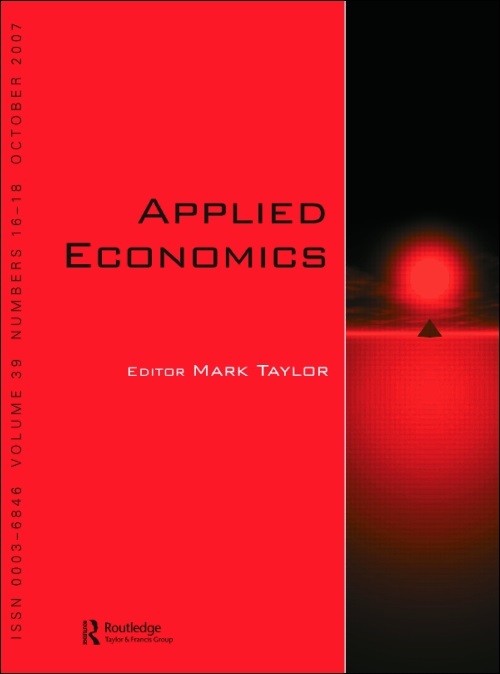
Foreign Bank Ownership and Income Inequality: Empirical Evidence
in: Applied Economics, Nr. 11, 2020
Abstract
Using country-level panel data over 1995–2013 on within-country income inequality and foreign bank presence, this paper establishes a positive relation between the two, running from higher foreign bank presence to income inequality. Given that foreign bank participation increased by 62% over the period 1995 to 2013, our baseline results imply a 5.8% increase in the Gini coefficient on average over this period, ceteris paribus. These results are robust to the inclusion of country and year fixed effects and to the use of restrictions on foreign bank entry in the host countries as an instrumental variable. We show that this positive effect is channelled through the lack of greenfield entry and the associated lower levels of competition.
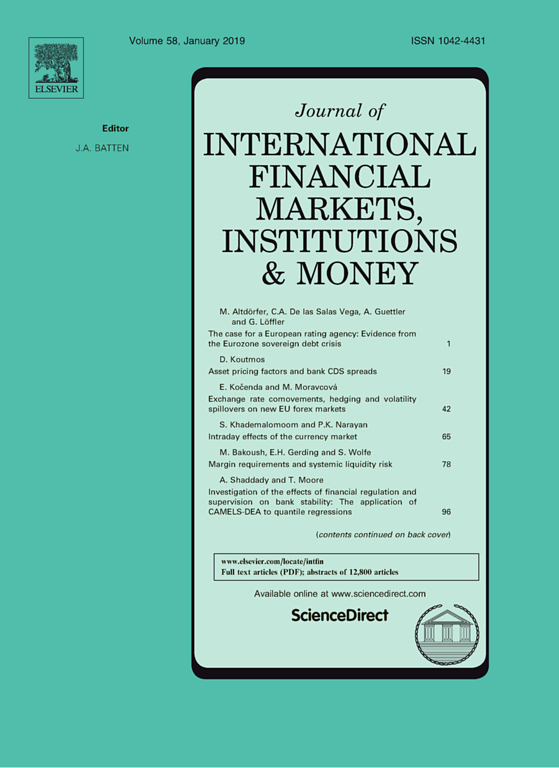
Comparing Financial Transparency between For-profit and Nonprofit Suppliers of Public Goods: Evidence from Microfinance
in: Journal of International Financial Markets, Institutions and Money, January 2020
Abstract
Previous research finds market financing is favored over relationship financing in environments of better governance, since the transaction costs to investors of vetting asymmetric information are thereby reduced. For industries supplying public goods, for-profits rely on market financing, while nonprofits rely on relationships with donors. This suggests that for-profits will be more inclined than nonprofits to improve financial transparency. We examine the impact of for-profit versus nonprofit status on the financial transparency of firms engaged with supplying public goods. There are relatively few industries that have large number of both for-profit and nonprofit firms across countries. However, the microfinance industry provides the opportunity of a large number of both for-profit and nonprofit firms in relatively equal numbers, across a wide array of countries. Consistent with our prediction, we find that financial transparency is positively associated with a for-profit status. Results will be of broad interest both to scholars interested in the roles of transparency and transaction costs on market versus relational financing; as well as to policy makers interested in the impact of for-profit on the supply of public goods, and on the microfinance industry in particular.
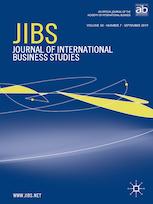
Foreign Ownership, Bank Information Environments, and the International Mobility of Corporate Governance
in: Journal of International Business Studies, Nr. 9, 2019
Abstract
This paper investigates how foreign ownership shapes bank information environments. Using a sample of listed banks from 60 countries over 1997–2012, we show that foreign ownership is significantly associated with greater (lower) informativeness (synchronicity) in bank stock prices. We also find that stock returns of foreign-owned banks reflect more information about future earnings. In addition, the positive association between price informativeness and foreign ownership is stronger for foreign-owned banks in countries with stronger governance, stronger banking supervision, and lower monitoring costs. Overall, our evidence suggests that foreign ownership reduces bank opacity by exporting governance, yielding important implications for regulators and governments.
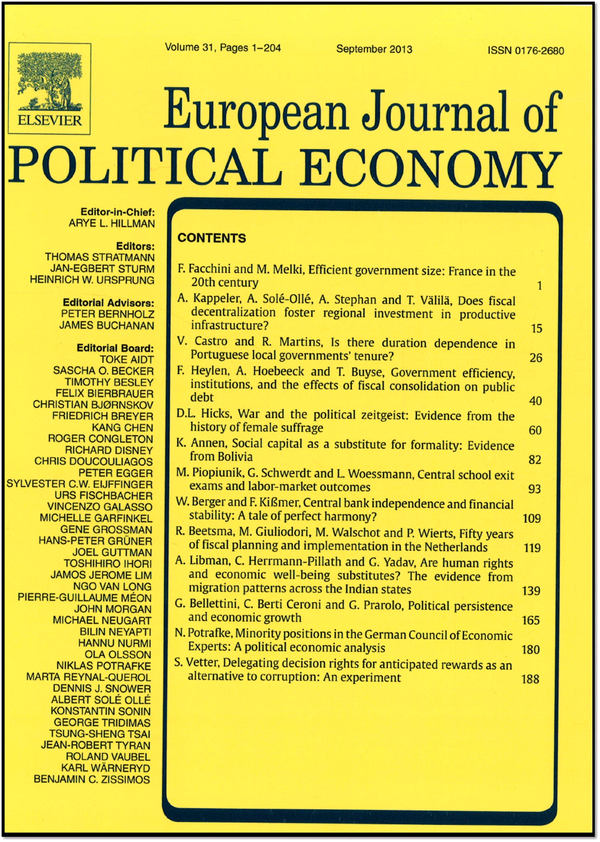
Delay Determinants of European Banking Union Implementation
in: European Journal of Political Economy, 2019
Abstract
Most countries in the European Union (EU) delay the transposition of European Commission (EC) directives, which aim at reforming banking supervision, resolution, and deposit insurance. We compile a systematic overview of these delays to investigate if they result from strategic considerations of governments conditional on the state of their financial, regulatory, and political systems. Transposition delays pertaining to the three Banking Union directives differ considerably across the 28 EU members. Bivariate regression analyses suggest that existing national bank regulation and supervision drive delays the most. Political factors are less relevant. These results are qualitatively insensitive to alternative estimation methods and lag structures. Multivariate analyses highlight that well-stocked deposit insurance schemes speed-up the implementation of capital requirements, banking systems with many banks are slower in implementing new bank rescue and resolution rules, and countries with a more intensive sovereign-bank nexus delay the harmonization of EU deposit insurance more.
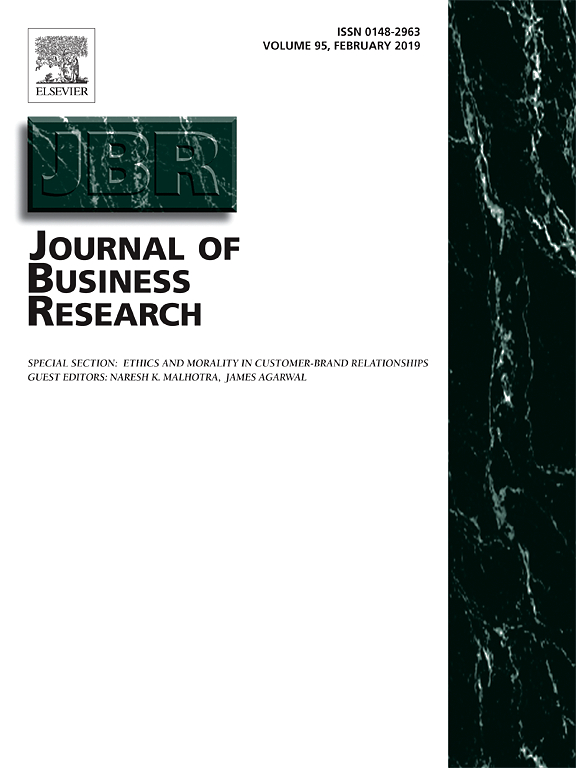
National Culture and Risk-taking: Evidence from the Insurance Industry
in: Journal of Business Research, April 2019
Abstract
The gravity of insurance within the financial sector is constantly increasing. Reasonably, after the events of the recent financial turmoil, the domain of research that examines the factors driving the risk-taking of this industry has been signified. The purpose of the present study is to investigate the interplay between national culture and risk of insurance firms. We quantify the cultural overtones, measuring national culture considering the dimensions outlined by the Hofstede model and risk-taking using the ‘Z-score’. In a sample consisting of 801 life and non-life insurance firms operating across 42 countries over the period 2007–2016, we find a strong and significant relationship among insurance firms' risk-taking and cultural characteristics, such as individualism, uncertainty avoidance and power distance. Results remain robust to a variety of firm and country-specific controls, alternative measures of risk, sample specifications and tests designed to alleviate endogeneity.














